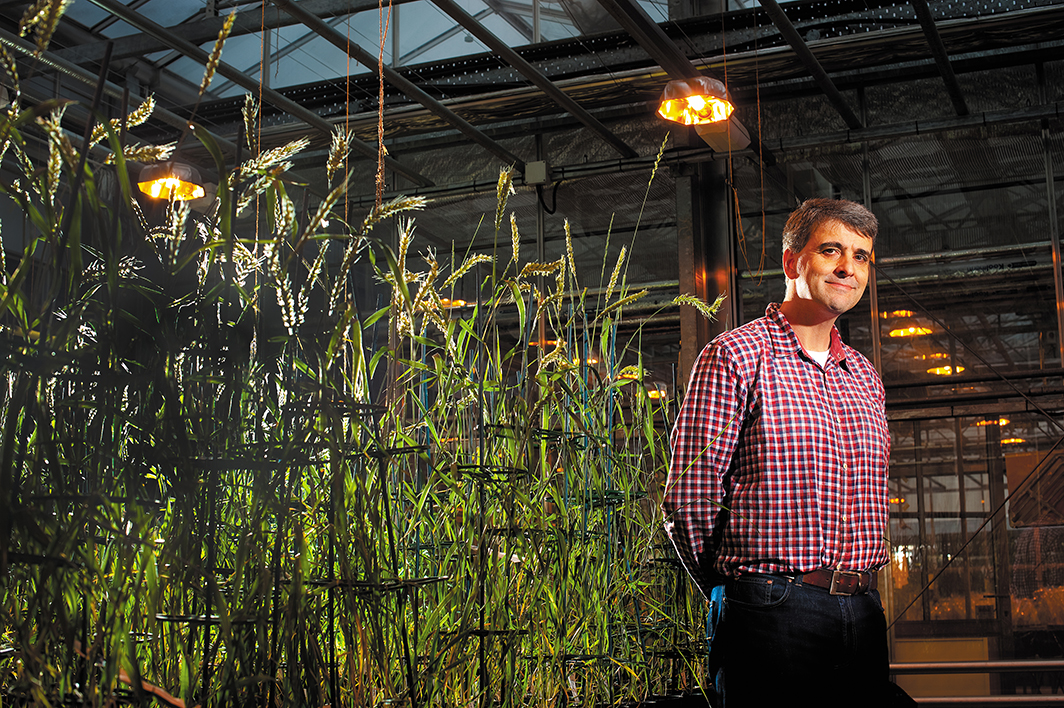
May 21, 2014, by Lindsay Brooke
‘Getting to the root’ of plant science
University of Nottingham plant scientist, Professor Malcolm Bennett, is among 106 outstanding researchers in life sciences newly elected as members of The European Molecular Biology Organisation (EMBO).
Malcolm Bennett, Professor of Plant Science in the School of Biosciences, said: “It is a great honour to have been elected as a member of EMBO and help shape the future of molecular bioscience research across Europe.”
His election recognises Professor Bennett’s contribution to revealing the mechanisms that control root growth and development in plants. Many of the genes and signals that regulate key root traits such as angle, depth and branching have been identified in either his group or in collaboration with other European labs using the model plant Arabidopsis thaliana.
The EMBO membership currently comprises more than 1600 life scientists that support researchers at all stages of their careers, stimulate the exchange of scientific information, and help build a European research environment where scientists can achieve their best work.
Professor Bennett’s pioneering work has been carried out at The Centre for Plant Integrative Biology (CPIB), a world-renowned interdisciplinary research centre in systems biology at The University of Nottingham, where Professor Bennett currently serves as its Director.
Efforts are underway at CPIB to use the knowledge generated by Professor Bennett’s team and their collaborators to develop new varieties of crops. Food security represents a pressing global issue. Crop production has to double by 2050 to keep pace with global population growth. This target is even more challenging given the impact of climate change on water availability and the drive to reduce fertilizer inputs to make agriculture more environmentally sustainable. Improving the water and nutrient uptake efficiency of plants would help to increase yields. Roots play a key role controlling water and nutrient uptake efficiency. Understanding the genes and other signals that control root development is therefore critical to developing more sustainable crops.
In the last five years Professor Bennett has led efforts at CPIB to ‘uncover the hidden half’ of plants by imaging roots growing in soil. A recent BBSRC Professorial Research Fellowship (2010) and ERC Advanced Investigator (2012) award have made it possible to build a state-of-the-art X-ray CT imaging facility with a team of over 40 researchers spanning plant, soil, mathematical and computer sciences.
His current research focuses on discovering novel molecular mechanisms controlling root adaptive responses to environmental signals like nutrients or water in order to improve crop performance.
In 2013, his efforts to re-engineer root architecture were recognised with a Royal Society Wolfson Research Merit Award.
EMBO has decided to strategically expand the scope of its membership on the occasion of its 50th anniversary to honour the progress that has been made in the fields of neuroscience and ecology & evolution. The 106 new members for 2014 include 50 scientists who have made exceptional contributions to these research areas.
Maria Leptin, EMBO Director, said: “For the 50th anniversary of EMBO we are extremely pleased to welcome significantly more researchers to our membership than in previous years. In the past decades, many of the concepts, techniques and insights of molecular biology have been applied to fundamental questions in other disciplines of the life sciences. Molecular explanations are now emerging for the origins and functions of complex systems like the brain and the living world around us. We wanted to reflect more of these exciting developments in our membership.
“Great leaps in scientific progress often arise when fundamental approaches like molecular biology are applied to previously unconsidered or emerging disciplines. Looking forward, we want to ensure that all communities of the life sciences benefit from this type of cross-pollination.”
No comments yet, fill out a comment to be the first

Leave a Reply